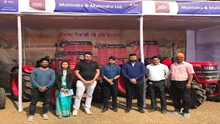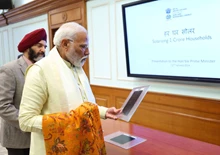
According to the most recent report released in 2022 by the International Federation of Organic Agriculture Movement (IFOAM) Germany and FiBL Switzerland, the global organic market has been expanding over the previous six years at a CAGR of 8.7%. (2015-2020). The market size has climbed from US $ 84 billion in 2015 to US $ 129 billion in 2020, which indicates that there is a rising demand for chemical-free organic produce on the global market.
There is no information available on domestic organic product consumption. However, there is a growing demand for organic products in the domestic market due to greater health awareness and increased support for organic farming.
Indian organic food market is anticipated to experience a CAGR of 25.25 percent between 2022 and 2027, according to IMARC research.
As per the information provided by the Union Minister of Agriculture and Farmers Welfare Narendra Singh Tomar in a written reply in Lok Sabha, to ensure the quality of organic products sold in the nation, two different types of organic certification systems have been devised:
i) For the development of the export market, third-party certification is provided by an accredited certification agency under the National Programme for Organic Production (NPOP) of the Ministry of Commerce and Industry
ii) PGS-India, or Participatory Guarantee System, is an initiative of the Ministry of Agriculture and Farmers Welfare to address the domestic market need
The Government of India's Ministry of Commerce and Industry introduced NPOP in 2001. Through its approved Certification Bodies (CBs), the NPOP not only provides the institutional structure for the accreditation of certification agencies and the operationalization of the certification programme, but it also makes sure that the system functions properly and is regularly monitored.
The production and handling of activities at all phases, including the manufacture, processing, trade, and export requirements for organic products, are covered by the NPOP, a third-party certification programme. Additionally, organic products are graded and subject to the same quality control standards as conventional ones.
The Participatory Guarantee System of India (PGS-India) is being implemented by the government as part of the PGS-India programme as a quality assurance initiative for the certification of organic produce that is relevant to the local area, focusing on stakeholder participation, including producers/farmers and consumers, and operating outside the parameters of third-party certification.
By evaluating, inspecting, and verifying one another's production practises, stakeholders (including farmers and producers) participate in decision-making and crucial judgements about the operation of the PGS-India certification itself. This allows them to collectively proclaim goods to be organic.











